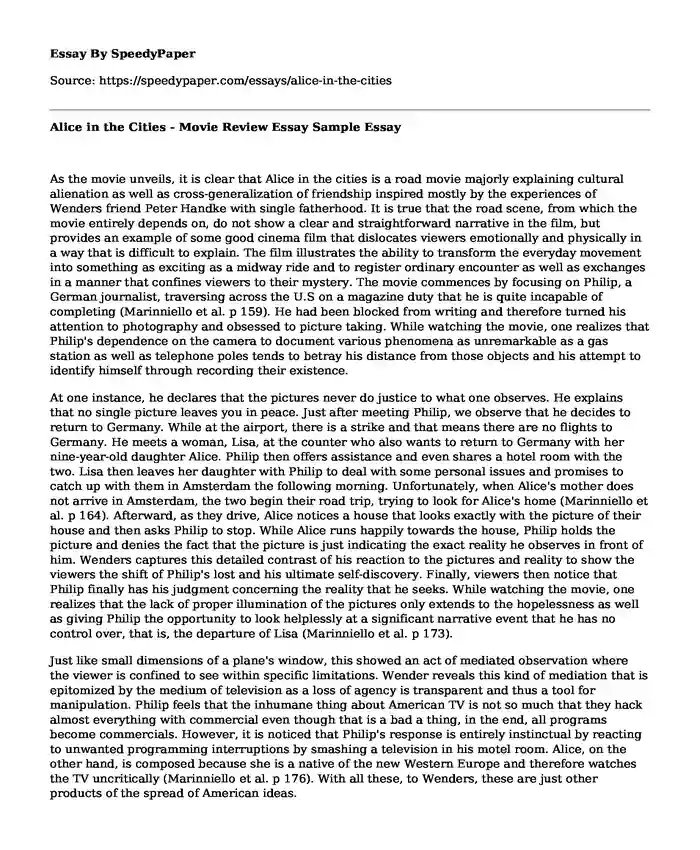As the movie unveils, it is clear that Alice in the cities is a road movie majorly explaining cultural alienation as well as cross-generalization of friendship inspired mostly by the experiences of Wenders friend Peter Handke with single fatherhood. It is true that the road scene, from which the movie entirely depends on, do not show a clear and straightforward narrative in the film, but provides an example of some good cinema film that dislocates viewers emotionally and physically in a way that is difficult to explain. The film illustrates the ability to transform the everyday movement into something as exciting as a midway ride and to register ordinary encounter as well as exchanges in a manner that confines viewers to their mystery. The movie commences by focusing on Philip, a German journalist, traversing across the U.S on a magazine duty that he is quite incapable of completing (Marinniello et al. p 159). He had been blocked from writing and therefore turned his attention to photography and obsessed to picture taking. While watching the movie, one realizes that Philip's dependence on the camera to document various phenomena as unremarkable as a gas station as well as telephone poles tends to betray his distance from those objects and his attempt to identify himself through recording their existence.
At one instance, he declares that the pictures never do justice to what one observes. He explains that no single picture leaves you in peace. Just after meeting Philip, we observe that he decides to return to Germany. While at the airport, there is a strike and that means there are no flights to Germany. He meets a woman, Lisa, at the counter who also wants to return to Germany with her nine-year-old daughter Alice. Philip then offers assistance and even shares a hotel room with the two. Lisa then leaves her daughter with Philip to deal with some personal issues and promises to catch up with them in Amsterdam the following morning. Unfortunately, when Alice's mother does not arrive in Amsterdam, the two begin their road trip, trying to look for Alice's home (Marinniello et al. p 164). Afterward, as they drive, Alice notices a house that looks exactly with the picture of their house and then asks Philip to stop. While Alice runs happily towards the house, Philip holds the picture and denies the fact that the picture is just indicating the exact reality he observes in front of him. Wenders captures this detailed contrast of his reaction to the pictures and reality to show the viewers the shift of Philip's lost and his ultimate self-discovery. Finally, viewers then notice that Philip finally has his judgment concerning the reality that he seeks. While watching the movie, one realizes that the lack of proper illumination of the pictures only extends to the hopelessness as well as giving Philip the opportunity to look helplessly at a significant narrative event that he has no control over, that is, the departure of Lisa (Marinniello et al. p 173).
Just like small dimensions of a plane's window, this showed an act of mediated observation where the viewer is confined to see within specific limitations. Wender reveals this kind of mediation that is epitomized by the medium of television as a loss of agency is transparent and thus a tool for manipulation. Philip feels that the inhumane thing about American TV is not so much that they hack almost everything with commercial even though that is a bad a thing, in the end, all programs become commercials. However, it is noticed that Philip's response is entirely instinctual by reacting to unwanted programming interruptions by smashing a television in his motel room. Alice, on the other hand, is composed because she is a native of the new Western Europe and therefore watches the TV uncritically (Marinniello et al. p 176). With all these, to Wenders, these are just other products of the spread of American ideas.
Work Cited
Mariniello, Silvestra, and James Cisneros. "Experience and memory in the films of Wim Wenders." Substance 34.1 (2005): 159-179.
Cite this page
Alice in the Cities - Movie Review Essay Sample. (2022, Sep 07). Retrieved from https://speedypaper.com/essays/alice-in-the-cities
Request Removal
If you are the original author of this essay and no longer wish to have it published on the SpeedyPaper website, please click below to request its removal:
- Nutrition Essay Sample: Diet Analysis with Specific Nutritional Goals
- Free Essay on Ideology and Popular Culture
- Nestle Essay Example
- Free Paper Sample: Evolution, Concepts, and Future of Project Management
- Debt-Financed Tax Cuts - Essay Sample on George W. Bush Policy
- Essay Example on Teaching and Philosophy
- Essay Example: Emerging Consumer Markets
Popular categories





